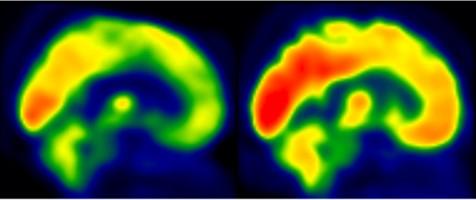IMAGE: Representative brain glucose metabolism scan from a participant in the usual low level of physical activity group (left) and from a participant in the moderate intensity aerobic training group (right)….
view more
Brain Plasticity
Amsterdam, NL, February 3, 2020 – Individuals at risk for Alzheimer’s disease (AD) because of family history or genetic predisposition who engaged in six months of aerobic exercise training improved their brain glucose metabolism and higher-order thinking abilities (e.g., planning and mental flexibility) called executive function; these improvements occurred in conjunction with increased cardiorespiratory fitness. The results of this study are published in a special issue of Brain Plasticity devoted to Exercise and Cognition.
Drugs currently available to treat AD have limited therapeutic capacity. At a time when both the human and monetary costs of the disease are projected to rise dramatically in the coming decades, there is a critical need to provide individuals with readily-deployable strategies that can decrease the likelihood of acquiring the disease or slow its progression. Researchers therefore investigated whether exercise training in asymptomatic individuals harboring risk for AD improves markers associated with AD.
“This study is a significant step toward developing an exercise prescription that protects the brain against AD, even among people who were previously sedentary,” explained lead investigator Ozioma C. Okonkwo, PhD, of the Wisconsin Alzheimer’s Disease Research Center, University of Wisconsin School of Medicine and Public Health.
The study investigated 23 cognitively normal,…



